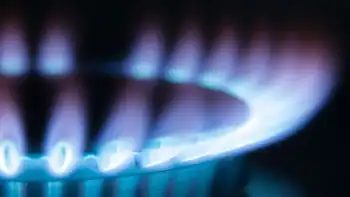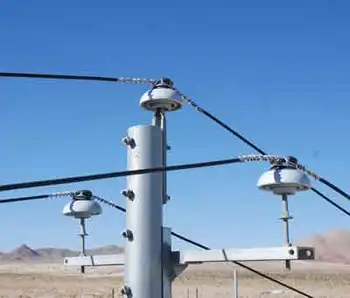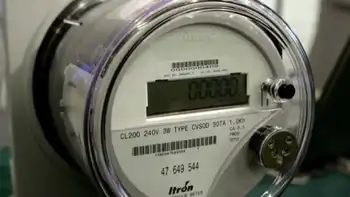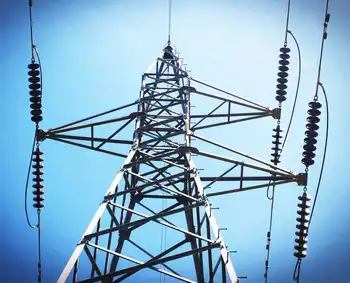- DOE's plans for nuke waste disposal faces problems
Nuclear energy may be powerful but it must still overcome some daunting obstacles, such as finding a permanent nuclear waste facility and winning over investors to build new plants. Opening Yucca Mountain by 2010 to allow 77,000 tons of spent fuel to be buried is a top goal for the Department of Energy.
Experts say that nuclear waste could be stored safely at Yucca Mountain, noting that the climate is arid and what little rainfall does hit the area is washed into a distant valley. Others, however, say that the site is potentially fatal and point to possible volcanic activity that could permit radioactive materials to escape. The friction has caused the site's opening to be delayed from 1998 to 2010, or even longer.
The debate is now thundering through the halls of Congress. The House has approved $765 million to develop the site that is about 90 miles northwest of Las Vegas but a Senate committee approved just $425 million; an insufficient figure to sustain the site, backers say. The rancor could cause the Energy Department to miss its 2004 deadline to submit a license application to the Nuclear Regulatory Commission (NRC).
The Yucca Mountain site did get the thumbs up from the General Accounting Office with regards to possible terrorist activity. The likelihood of any such attack having success as the spent fuel is transported is very low and & extremely unlikely because the material is hard to disperse and is stored in protective containers, it says.
"Spent nuclear fuel belongs at Yucca Mountain when the facility is licensed," says Rep. Joe Barton, R-Texas, chairman of the House Energy and Air Quality Subcommittee. "Opponents of nuclear power exploited fears of terrorist activity and said waste should not be moved off site. Not only is that a back door way to try and stop nuclear power, but that argument is also wrong, as this GAO report indicates." Currently, 103 nuclear reactors exist and generate 20 percent of the electricity in the United States. Those generators store 50,000 tons of waste at 72 sites in 33 states. The Energy Department, which has spent $4 billion and 20 years studying the Yucca site, says that it will take 24 years and 175 shipments to get the Yucca site stockpiled - a step that the administration says is essential so that current repositories do not become permanent facilities.
Financial Help
Opponents of storing spent fuel at Yucca Mountain are suing to prevent the site from being used. They argue that it is unsafe and that regulatory changes by the NRC and Energy Department that have streamlined the permitting process are working to sidestep due process. Their case is set for January 2004.
The fight over Yucca Mountain is another avenue for critics to express their concern over nuclear safety. FirstEnergy Corp.'s Davis-Besse plant in Ohio, for example, halted operations in February 2002 because leaking boric acid had eaten through the six-inch lid that seals off the reactor vessel. Since that time, the Akron, Ohio-based utility has revamped its nuclear operations and spent millions adding safety measures, all so that the plant can resume operations in November. The NRC has yet to give its final approval.
No new nuclear power projects have been constructed in the United States since 1979, when Three Mile Island in Pennsylvania suffered a partial meltdown of the reactor's core. Since that time, the Chernobyl accident in the Ukraine has made the mission of restoring confidence in nuclear power even more challenging. "The proponents of dumping nuclear waste in Nevada don't care how much money is wasted or how many lives could be at risk from shipments of radioactive garbage to Yucca Mountain," says Rep. Shelley Berkley, D-Nev. Nuclear opponents are fighting against an administration that says nuclear energy is vital to America's energy mix and which supports policies to assure those aims. To facilitate development, Congress could pass a measure that would guarantee about $15 billion in loans to nuclear power plant developers, all to offset the high, upfront capital costs that are preventing them from taking risks. It coincides with another bill to re-authorize the Price-Anderson Act that has limited nuclear power operators' liabilities risks since 1957 to $9.3 billion.
The Nuclear Energy Institute in Washington admits that overcoming the financial impediments is precarious but says that the soonest any new nuclear facility would come on line is 2011. By that time, the industry will have honed its risk management skills, it says. Once a plant is up and running, the operating and maintenance costs are low, at about 1.7 cents a kilowatt hour. That compares to 3-5 cents for coal and natural gas. Dominion Resources, Entergy Corp. and Exelon Corp. are upbeat, having filed for early site permits to build new reactors at existing locations.
"The industry's legacy of cost growth, technological problems, cumbersome political and regulatory oversight, and the newer risks brought about by competition and terrorism concerns may keep credit risk too high for even (federal legislation that provides loan guarantees) to overcome," says Peter Rigby, with Standard & Poors. In the meantime, nuclear plant operators are extending the licenses that they have on their existing plants another 20 years. The NRC has voted to allow 14 reactors such an extension while another 25 await its okay. At the same time, nuclear plants are running at nearly 92 percent of capacity, which allowed them to produce 26,000 more megawatts of electricity than in 1990.
Healthy Debate
If new plants are going to get built, it must make economic sense to investors. That means satisfying concerns over safety and the environment. Nuclear proponents look at the choices and see coal and natural gas as competing fuel sources. Coal and natural gas emit regulated pollutants and natural gas remains in short supply. Nuclear energy, by comparison, has zero air emissions and has reserves that could last thousands of years.
Exelon Corp., the nation's biggest nuclear energy utility, says that if the company is to build for the future then the nation's policies must provide certainty. The projected demand for electricity combined with the overriding need to reduce global warming should increase nuclear energy's stock, it says. But the life of a nuclear power plant is 40 years, it adds, and therefore the political support cannot waver.
"If we NIMBY anywhere and anytime, we should not expect the utility industry to provide electricity to everyone, everywhere, all of the time," says Norris McDonald, president of the African American Environmentalist Association, referring to Not in My Backyard issues. "If we believe that global warming is a real threat to our planet, then the very best way to provide base load electricity is through emission-free production of nuclear power."
Current nuclear plants are profitable for most operators, given the efficiency rates and the low operating cost. While the political atmosphere is warming up, utilities are still cautious about any future investments in the energy source because of the potential risks. The current discussions over Yucca Mountain and safety generally are necessary so that rational decisions can be made. If investors are satisfied, they will finance new development.
Related News

Restrict price charged for gas and electricity - British MPs
LONDON - MPs are calling for a cap on the price of gas and electricity amid fears consumers are being ripped off.
The Business, Energy and Industrial Strategy (BEIS) Select Committee says the Big Six energy companies have been overcharging for years.
MPs on the committee backed plans for a temporary absolute cap to fix what they called a "broken" energy market.
Labour's Rachel Reeves, who chairs the committee, said: "The energy market is broken. Energy is an essential good and yet millions of customers are ripped off for staying loyal to their energy provider.
"An energy price cap is now necessary and the…




